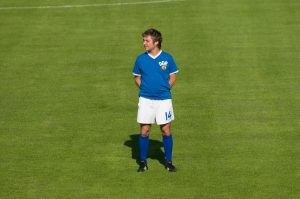PUBLIC ART MUNICH 2018 (PAM 2018)
Game Changers
30 April – 27 July 2018
Performative art in the city.
Curated by Joanna Warsza.
Commissioned by the City of Munich.
Grand Opening: 30 April, Olympic Stadium Munich
Commissioned Artists
Lawrence Abu Hamdan, Cana Bilir-Meier, Anders Eiebakke, Leon Eixenberger, Massimo Furlan, Mariam Ghani, Flaka Haliti & Markus Miessen, Rudolf Herz & Julia Wahren, Alexander Kluge, Anna McCarthy & Gabi Blum, Michaela Melián, Ari Benjamin Meyers, Dan Perjovschi, Alexandra Pirici & Jonas Lund, Olaf Nicolai, Students of the Academy of Fine Arts Munich, The 9th Futurological Congress/Julieta Aranda & Mareike Dittmer, Franz Wanner, Aleksandra Wasilkowska
Game Changers
PAM 2018 addresses the mechanisms of change and the fundamental shifts taking place today from the vantage point of Munich—a city that has experienced tremendous ideological, sociopolitical, and symbolic turns of events. The commissioned art projects span this complex history, from the Bavarian Soviet Republic, postwar denazification, Radio Free Europe, May 1968, the optimism and tolerance of the Olympic Stadium, 1989, the welcoming of refugees at Munich’s central station in 2015, to the impacts of digitalization, artificial intelligence, and the # MeToo movement. The question is not whether to take part but rather how to do so and on what terms. What should change and what shouldn’t?
PAM 2018 Opening Week
April 30 is the day of the Grand Opening commencing in the afternoon with Warsaw-based architect Aleksandra Wasilkowska’s instal action of a levitating ceiling entitled Gold for Natascha, Silver for Timofei in the East-West Peace Church. Seeking refuge in Munich after World War II, the exiled Russian hermit Timofei and his wife Natascha illegal y constructed this small temple opened to all forms of Christianity in the mid-1950s on the grounds of the future Olympic park. According to legend, the temple inspired the construction of the stadium’s floating roof and changed its top-down planning.
Parade of the W(e/a)k: Initiated by Anna McCarthy and Gabi Blum a procession will connect the East-West Peace Church to the Olympic stadium ending at the stadium with a live rendition of the former GDR and BRD national anthems, performed by Manuela Rzytki’s Köşk-Chor and accompanied by the band Moon Not War, to kick off the game.
The Grand Opening of PAM 2018 literally kicks off at 7pm at the Olympic Stadium with Swiss performance artist Massimo Furlan’s reenactment of the legendary 1974 World Cup match East Germany-West Germany. The game that ended with a score of 1:0 will be performed by only two participants, one as Sepp Maier (Massimo Furlan) and one as Jürgen Sparwasser (Franz Beil, a former actor at Berlin’s Volksbühne). Two original radio commentaries wil accompany the match, returning football —this time as art—to the Olympic arena. Bring your radio set!
On 1 May the program continues with Labor Day, the first round of live drawing sessions by Dan Perjovschi at the MaximiliansForum; the presentations of Jonas Lund’s Facebook piece Hi Munich: This One is For You! with personalized messages that reach every city inhabitant and problematize the use of social media as a presumed public sphere; as wel as the inauguration of the PAM Pavilion designed by Flaka Haliti and Markus Miessen. SALVAVITA, a the series of aperitifs at the Pavilion, wil end the day with drinks, snacks, and sunsets.
On 4–5 May the opening week concludes with the twenty-four-hour concert-installation Music from a Frontier Town by Michaela Melián at Munich Amerikahaus—the first such institution in postwar Germany.
PAM 2018 unfolds in time, each weekend presenting one of the 20 commissioned, time-based, performative projects along with an accompanying discursive program curated by Gürsoy Doğtaş.
PAM’s Open Art and Education Program will be realized in collaboration with students of the Academy of Fine Arts Munich, class Professor Florian Matzner and Ann-Jasmin Ratzel.
PAM 2018 is less interested in art in public space as a physical location, but rather seeks to address broader concepts of publicity, public opinion, common good, or public speech. PAM 2018 is interested in economizing attention on behalf of public interest rather than for monetary gain. PAM 2018 valorizes art that aspires to change the game by recontextualizing our points of view and, as a result, our actions.
An extensive catalogue (German, English) published in autumn will document and contextualize the program.


